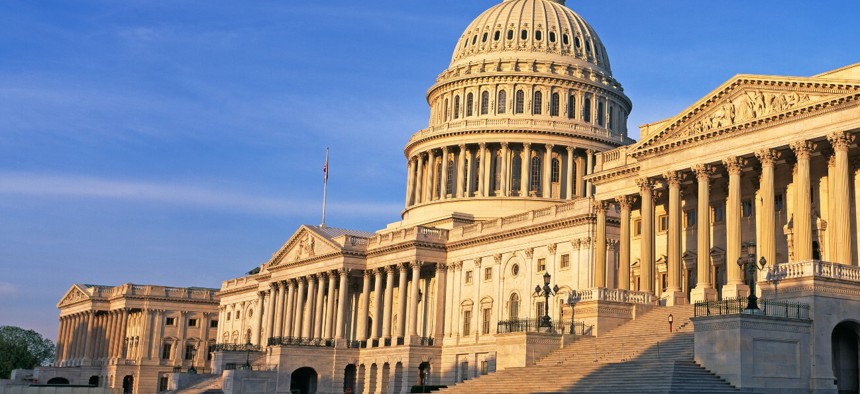Senate Reaches Deal to Avoid Shutdown, Punts Threat for 10 Weeks

The continuing resolution would keep the government open past the Friday evening expiration of current appropriations. Murat Taner/Getty Images

Connecting state and local government leaders
Lawmakers agreed to drop controversial provisions and set up a new deadline for a lame duck Congress.
This story was updated at 6:47 p.m. ET.
The Senate on Tuesday reached an agreement to keep agencies afloat through Dec. 16, dropping controversial provisions from a stopgap funding bill in order to win bipartisan support.
The continuing resolution, which would keep the government open past the Friday evening expiration of current appropriations, was originally set to include a measure to speed up the permitting process for some major energy projects. After Republican leaders and some Democrats came out against the provision on Tuesday, Democratic leadership agreed to drop the provision to ensure the CR could pass. The Senate on Tuesday evening, by a 72-23 margin, approved the first in a series of votes to move the measure forward.
Sen. Joe Manchin, D-W.Va., who authored the permitting changes, said just before a scheduled preliminary vote on the spending bill Tuesday evening that he did not want to put his permitting reforms up for a vote just to see them fail.
"For that reason, and my firmly held belief that we should never come to the brink of a government shutdown over politics, I have asked Majority Leader Schumer to remove the permitting language from the continuing resolution we will vote on this evening."
Senate Majority Leader Chuck Schumer, D-N.Y., who had promised to put the energy project changes into the CR as part of an agreement he struck this summer with Manchin to win his support for the Inflation Reduction Act, said minutes later on the Senate floor he agreed to strip the energy-related measure from the CR. Senate Minority Leader Mitch McConnell, R-Ky., put the death knell into the reform earlier in the day when he called it a “poison pill” and announced he would be voting against any CR that included it. He called on Democrats to put forward a spending measure without the energy provisions, saying such a bill would have bipartisan support. Many Republican lawmakers throughout the day Tuesday echoed that call for a CR vote without the permitting reforms—which they said did not go far enough—and offered their support for the rest of the stopgap bill.
The roughly 10-week spending bill would keep agencies funded at their current levels into the lame duck session of Congress, punting on appropriations until after the midterm elections but creating a new deadline before the new Congress is seated. The measure includes "anomalies" to provide funding increases for certain programs, such as $400 million to increase hiring at the Social Security Administration; $20 million for the Army Corps of Engineers to assist with the water crisis in Jackson, Mississippi; and $1 billion for the Health and Human Services Department's Low Income Home Energy Assistance Program. It also includes more than $12 billion for Ukraine aid, matching the White House’s request, and new funding for disaster relief. It would not provide the requested funds to address monkeypox and COVID-19.
The CR would reauthorize user fees for the Food and Drug Administration. Absent congressional action, the agency's ability to collect the fees would expire at the end of the month and 3,500 employees could face layoffs or furloughs. The agency has held off sending official notices to employees, citing expectations that Congress will act. The agency will, however, send the notices in the coming days if there is no movement on the user fees.
Sen. Patrick Leahy, D-Vt., who chairs the Senate Appropriations Committee, told reporters Tuesday that getting bipartisan agreement on the CR—absent the permitting reform—was a difficult process that required months of negotiations with his panel’s ranking member, Sen. Richard Shelby, R-Ala.
“We've reached an agreement on virtually every contentious part, Leahy said. “I didn't get every single thing I want and Shelby didn't get every single thing he wants. But both parties got a lot more than we might have if we hadn't had people negotiate.”
Leahy added the CR without the Manchin-backed provision had “remarkable support.” Earlier, Shelby had praised the “significant process” he and Leahy made toward a CR that was as “clean as possible,” but said he would not support it with permitting overhaul.
Prior to Manchin and Schumer’s announcement the permitting reforms were removed from the CR, there had been great uncertainty over how Congress would avoid a shutdown come Saturday morning. Some lawmakers suggested they could simply pass the spending measure without the controversial language, but the timing and process for that—including which chamber would initiate the vote—remained unresolved. By moving forward without the provision, the House should be able to follow the Senate in passing the bill as soon as Thursday.
Before his announcement that he was pulling the permitting bill from the CR, Manchin hinted to reporters he was not willing to risk its inclusion.
“You just never shut the government down,” Manchin said. “I mean, it’s never in my vocabulary and politics shouldn't play that part.”
If Congress can avoid a shutdown and pass the CR through Dec. 16, it will have 10 weeks to come up with full-year appropriations or approve another stopgap measure. Democrats and Republicans remain sharply divided on the top-line funding levels for defense and non-defense agencies. Lawmakers in both parties also said Tuesday they would work on bipartisan permitting reform during the lame duck session of Congress.
The White House said on Tuesday it strongly supported the new version of the CR and pledged to work with lawmakers to pass full-year fiscal 2023 spending bills that “make bold, forward-looking investments for the nation’s future.”
The CR would “keep the federal government open and allow for more time for the Congress to reach a bipartisan agreement on full-year appropriations bills for FY 2023, while ensuring that the critical public services and protections that the American people rely on would continue, uninterrupted.”
Leahy called on Congress not to pass any more stopgap measures after the new one expires.
"Running on autopilot after December would be irresponsible, and the American people deserve more," Leahy said. "Now Congress must do its job and complete the appropriations process before the end of the year.
Shelby said there were still “a lot of things” to iron out for an agreement on full-year appropriations.
“We're not there yet," Shelby said after Tuesday's vote. "If we get the CR out of the way, I think the focus then will all go on the omnibus."

NEXT STORY: The Battle Over a 'Millionaires Tax' Heats Up in Massachusetts



